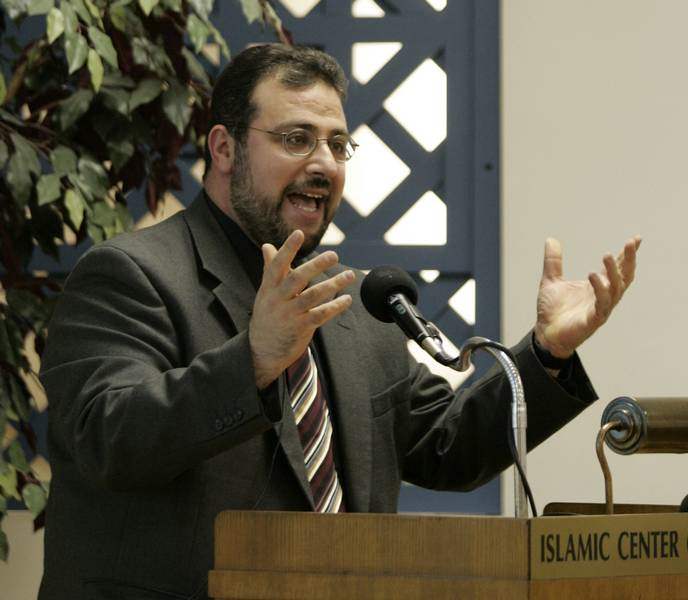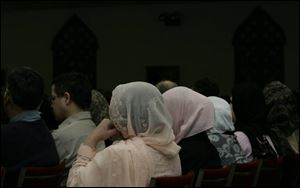
Prominent cleric tries to demystify Islam
2/26/2006
Imam Yahya Hendi addresses a crowd of about 350 people at the Islamic Center of Greater Toledo.

Imam Yahya Hendi addresses a crowd of about 350 people at the Islamic Center of Greater Toledo.
A nationally known Muslim cleric said in a lecture last night that violence over Danish caricatures of the prophet Mohammed violated Islamic teachings and resulted from a growing perception among Muslims that their religion is hated by Westerners.
Some people think there is an attack on Islam from the West, and every time they hear something related to their religion, they see another attack against Islam, Imam Yahya Hendi said at the Islamic Center of Greater Toledo.
The conference room at the prominent mosque alongside I-75 and I-475 was packed with 350 people of diverse faiths, marking the close of a week in which the local Muslim community was rocked by federal investigations of a local Islamic charity and three Toledo Muslims for alleged links to terrorism.
Imam Hendi of Washington said the Arab Muslim world vividly remembers President Bush s use of the term crusade when describing the United States war on terrorism after the Sept. 11, 2001, attacks.
He said Muslims also were offended by the Rev. Franklin Graham s vow to spend $5 million to send missionaries to Iraq and turn them away from Islam to the peacefulness of Christianity.
In Western countries, people often joke about religious symbols, he said, but such actions are not acceptable in Arab and Muslim nations.
There is what I call a clash of understanding, Imam Hendi said.
In the West, we make fun of Moses, Joseph, Jesus, priests, imams, and each other all the time. We have gotten used to that in American culture. In the Muslim world, you do not find that and in Arab cultures in general, not just among Muslims. You never find a Christian Arab making fun of religious symbols.
Imam Hendi, 39, is the Muslim chaplain at Georgetown University, the first full-time Muslim chaplain at any major American university.
He also is the imam of the Islamic Center of Frederick, Md., the Muslim chaplain at the National Naval Medical Center in Bethesda, Md., and a spokesman for the Islamic Jurisprudence Council of North America.

Women were a big topic of speaker Imam Yahya Hendi, who discussed international Muslims' response to cartoons of Mohammed.
My friends, we are making history tonight, he said.
Some people say Muslims, Christians, and Jews will never come together in one room. We will. And not only tonight, but we will continue in the direction of interreligious relationships, Imam Hendi said.
The time has come for our religious communities to transcend the limits of theologies that have separated us from each other and come together. There is no way to peace; peace is the way, he said.
In the first hour of his presentation, Imam Hendi provided a scholarly overview of the life and teachings of the prophet Mohammed, who was born in Mecca, now Saudi Arabia, in 570 A.D.
Using a PowerPoint slide presentation, he described the common lineage of Islam with Judaism and Christianity, all three being descendants of Abraham, and how Mohammed preached a message of peace and tolerance even in the face of persecution.
Although Mohammed s teachings on warfare are often quoted, Imam Hendi said the prophet stressed that war was justified only in self-defense, and he put strict limits on warfare.
Even in self-defense, Mohammed forbade his followers from attacking civilians, destroying agricultural land or poisoning water, or attacking religious temples, the imam said.
Mohammed himself was at war a total of 79 days out his 63 years on Earth, but some people take his war comments out of context.
The imam also described Mohammed s teachings on equality for women, saying he gave women prominence in his advisory council, called for education of women, and gave them the right to divorce, all radical concepts in his era and culture.
Contact David Yonke at: dyonke@theblade.com or 419-724-6154.